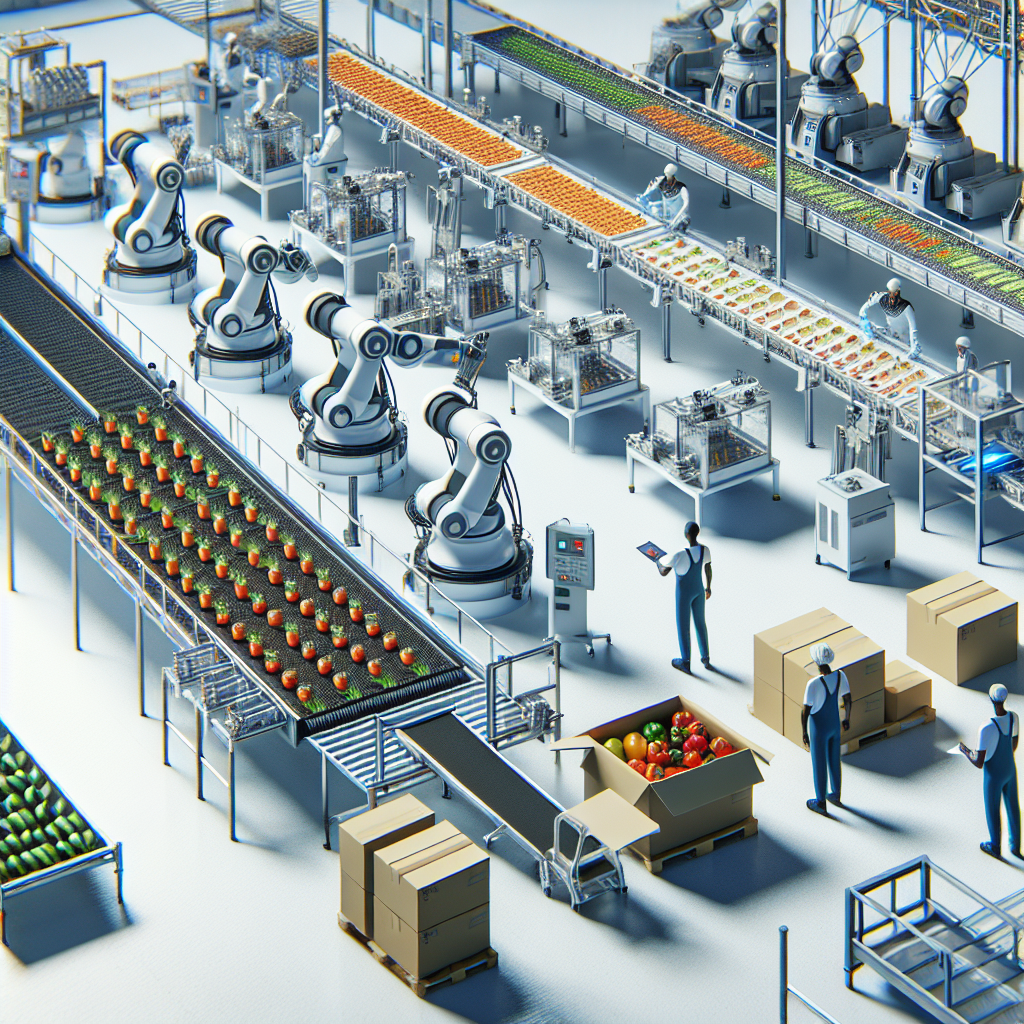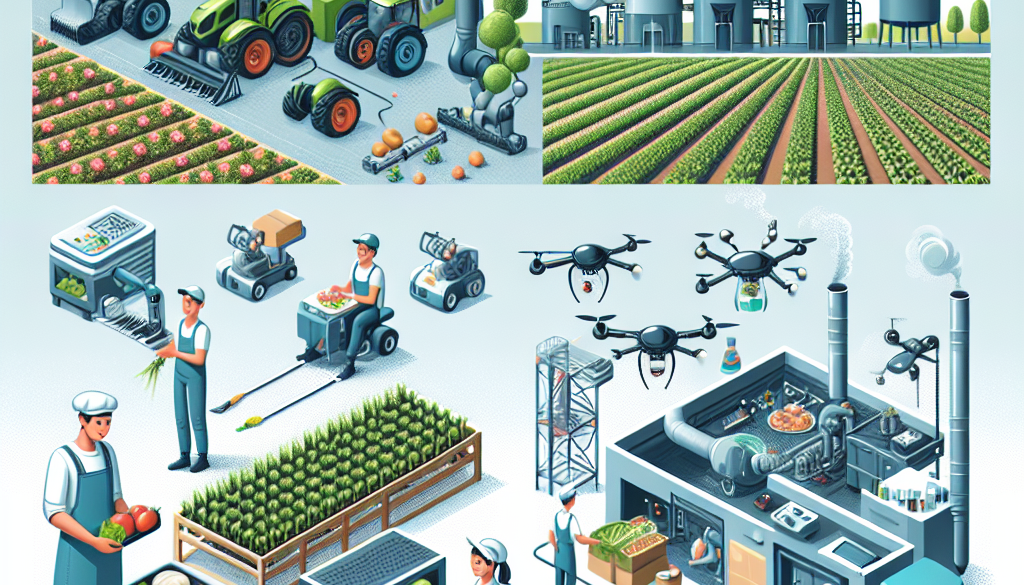Applications of Automation in the Production and Distribution of Food
-
Table of Contents
- Automation in Food Production and Distribution: Revolutionizing the Industry
- The Rise of Automation in Food Production
- Efficiency in Food Packaging and Safety
- Automated Food Distribution and Logistics
- Statistics Supporting the Automation Trend
- Challenges and Considerations
- Conclusion: Embracing the Future of Food Production and Distribution
- ETprotein: Your Partner for High-Quality Protein Products
Automation in Food Production and Distribution: Revolutionizing the Industry

The food industry is undergoing a significant transformation, thanks to the advent of automation technologies. Automation in food production and distribution is not just a futuristic concept; it’s a present-day reality that’s reshaping how we grow, process, package, and deliver food products. This article delves into the various applications of automation across the food supply chain, highlighting the benefits and advancements that are driving efficiency, safety, and sustainability in the sector.
The Rise of Automation in Food Production
Automation in food production is revolutionizing the way we cultivate and harvest crops, raise livestock, and process food items. Here are some key areas where automation is making a significant impact:
- Smart Farming: Automated technologies such as drones, sensors, and GPS-guided equipment are enabling precision agriculture. Farmers can now monitor crop health, soil conditions, and weather patterns to make data-driven decisions that optimize resource use and increase yields.
- Robotic Harvesting: Robots equipped with advanced vision systems and dexterous grippers are being deployed to pick fruits and vegetables. This not only speeds up the harvesting process but also reduces waste and labor costs.
- Automated Livestock Management: From robotic milking machines to automated feeding systems, technology is improving the efficiency and welfare of livestock operations.
- Food Processing Automation: In food processing plants, automation is streamlining tasks such as sorting, cutting, and packaging. This not only accelerates production but also enhances food safety by minimizing human contact.
Efficiency in Food Packaging and Safety
Automation extends beyond production to the packaging phase, where precision and hygiene are paramount. Automated packaging lines can rapidly fill, seal, label, and pack products with consistent quality. Moreover, automated inspection systems utilize cameras and sensors to detect contaminants and packaging defects, ensuring that only safe and intact products reach consumers.
Automated Food Distribution and Logistics
The distribution of food is another area where automation is making strides. Here’s how:
- Warehouse Automation: Automated storage and retrieval systems (AS/RS) and autonomous guided vehicles (AGVs) are optimizing warehouse operations, reducing errors, and improving inventory management.
- Delivery Robots and Drones: Companies are experimenting with unmanned aerial vehicles (UAVs) and ground robots for last-mile delivery, aiming to reduce delivery times and costs.
- Supply Chain Management: Automation software is enhancing supply chain visibility and coordination, allowing companies to respond swiftly to demand changes and mitigate disruptions.
Statistics Supporting the Automation Trend
According to a report by the Association for Packaging and Processing Technologies (PMMI), the food processing and packaging industry is expected to experience a significant increase in automation over the next decade. The report indicates that labor shortages and the need for flexibility in production are driving this trend. Additionally, a study by MarketsandMarkets projects that the food robotics market will reach USD 3.1 billion by 2025, growing at a CAGR of 12.7% from 2020 to 2025.
Challenges and Considerations
While automation offers numerous benefits, there are challenges to consider:
- Initial Investment: The cost of implementing automation technologies can be high, posing a barrier for small and medium-sized enterprises.
- Workforce Impact: Automation can lead to job displacement, necessitating retraining programs for workers to take on new roles in the automated environment.
- Technical Complexity: Integrating and maintaining sophisticated automation systems require specialized skills and ongoing support.
Conclusion: Embracing the Future of Food Production and Distribution
Automation is transforming the food industry, offering enhanced efficiency, safety, and sustainability. From smart farming to automated distribution, the applications of automation are vast and continue to evolve. As the industry adapts to these changes, it’s crucial to address the challenges and ensure a smooth transition into this new era of food production and distribution.
ETprotein: Your Partner for High-Quality Protein Products
In line with the advancements in food production and distribution, ETprotein is at the forefront of providing high-quality protein products that cater to the evolving needs of the industry. Their extensive range of organic bulk vegan proteins and L-(+)-Ergothioneine (EGT) products are ideal for companies looking to incorporate premium ingredients into their offerings. With a commitment to non-GMO, allergen-free attributes, and high purity levels, ETprotein is the go-to source for protein needs in various sectors, including food and beverage, sports nutrition, and health and wellness.
About ETprotein:
ETprotein, a reputable protein and L-(+)-Ergothioneine (EGT) Chinese factory manufacturer and supplier, is renowned for producing, stocking, exporting, and delivering the highest quality organic bulk vegan proteins and L-(+)-Ergothioneine. They include Organic rice protein, clear rice protein, pea protein, clear pea protein, watermelon seed protein, pumpkin seed protein, sunflower seed protein, mung bean protein, peanut protein, and L-(+)-Ergothioneine EGT Pharmaceutical grade, L-(+)-Ergothioneine EGT food grade, L-(+)-Ergothioneine EGT cosmetic grade, L-(+)-Ergothioneine EGT reference grade and L-(+)-Ergothioneine EGT standard. Their offerings, characterized by a neutral taste, non-GMO, allergen-free attributes, with L-(+)-Ergothioneine purity over 98%, 99%, cater to a diverse range of industries. They serve nutraceutical, pharmaceutical, cosmeceutical, veterinary, as well as food and beverage finished product distributors, traders, and manufacturers across Europe, USA, Canada, Australia, Thailand, Japan, Korea, Brazil, and Chile, among others.
ETprotein specialization includes exporting and delivering tailor-made protein powder and finished nutritional supplements. Their extensive product range covers sectors like Food and Beverage, Sports Nutrition, Weight Management, Dietary Supplements, Health and Wellness Products, and Infant Formula, ensuring comprehensive solutions to meet all your protein needs.
As a trusted company by leading global food and beverage brands and Fortune 500 companies, ETprotein reinforces China’s reputation in the global arena. For more information or to sample their products, please contact them and email sales(at)ETprotein.com today.












